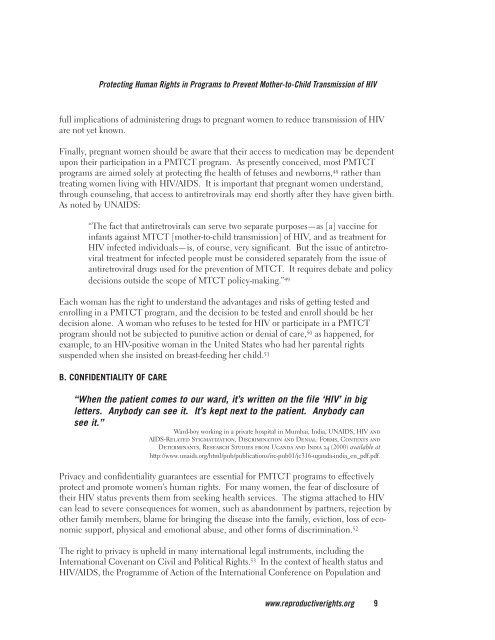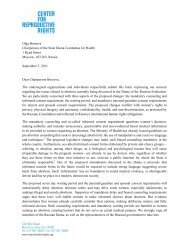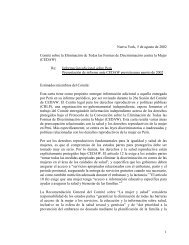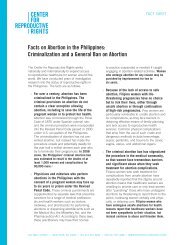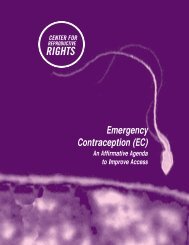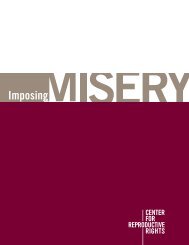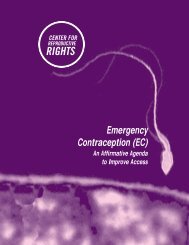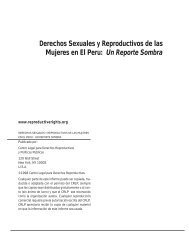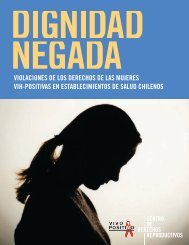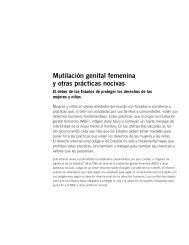Pregnant Women Living with HIV/AIDS: - Center for Reproductive ...
Pregnant Women Living with HIV/AIDS: - Center for Reproductive ...
Pregnant Women Living with HIV/AIDS: - Center for Reproductive ...
You also want an ePaper? Increase the reach of your titles
YUMPU automatically turns print PDFs into web optimized ePapers that Google loves.
Protecting Human Rights in Programs to Prevent Mother-to-Child Transmission of <strong>HIV</strong>full implications of administering drugs to pregnant women to reduce transmission of <strong>HIV</strong>are not yet known.Finally, pregnant women should be aware that their access to medication may be dependentupon their participation in a PMTCT program. As presently conceived, most PMTCTprograms are aimed solely at protecting the health of fetuses and newborns, 48 rather thantreating women living <strong>with</strong> <strong>HIV</strong>/<strong>AIDS</strong>. It is important that pregnant women understand,through counseling, that access to antiretrovirals may end shortly after they have given birth.As noted by UN<strong>AIDS</strong>:“The fact that antiretrovirals can serve two separate purposes—as [a] vaccine <strong>for</strong>infants against MTCT [mother-to-child transmission] of <strong>HIV</strong>, and as treatment <strong>for</strong><strong>HIV</strong> infected individuals—is, of course, very significant. But the issue of antiretroviraltreatment <strong>for</strong> infected people must be considered separately from the issue ofantiretroviral drugs used <strong>for</strong> the prevention of MTCT. It requires debate and policydecisions outside the scope of MTCT policy-making.” 49Each woman has the right to understand the advantages and risks of getting tested andenrolling in a PMTCT program, and the decision to be tested and enroll should be herdecision alone. A woman who refuses to be tested <strong>for</strong> <strong>HIV</strong> or participate in a PMTCTprogram should not be subjected to punitive action or denial of care, 50 as happened, <strong>for</strong>example, to an <strong>HIV</strong>-positive woman in the United States who had her parental rightssuspended when she insisted on breast-feeding her child. 51B. CONFIDENTIALITY OF CARE“When the patient comes to our ward, it’s written on the file ‘<strong>HIV</strong>’ in bigletters. Anybody can see it. It’s kept next to the patient. Anybody cansee it.”Ward-boy working in a private hospital in Mumbai, India, UN<strong>AIDS</strong>, <strong>HIV</strong> and<strong>AIDS</strong>-Related Stigmatization, Discrimination and Denial: Forms, Contexts andDeterminants, Research Studies from Uganda and India 24 (2000) available athttp://www.unaids.org/html/pub/publications/irc-pub01/jc316-uganda-india_en_pdf.pdf.Privacy and confidentiality guarantees are essential <strong>for</strong> PMTCT programs to effectivelyprotect and promote women’s human rights. For many women, the fear of disclosure oftheir <strong>HIV</strong> status prevents them from seeking health services. The stigma attached to <strong>HIV</strong>can lead to severe consequences <strong>for</strong> women, such as abandonment by partners, rejection byother family members, blame <strong>for</strong> bringing the disease into the family, eviction, loss of economicsupport, physical and emotional abuse, and other <strong>for</strong>ms of discrimination. 52The right to privacy is upheld in many international legal instruments, including theInternational Covenant on Civil and Political Rights. 53 In the context of health status and<strong>HIV</strong>/<strong>AIDS</strong>, the Programme of Action of the International Conference on Population andwww.reproductiverights.org 9


